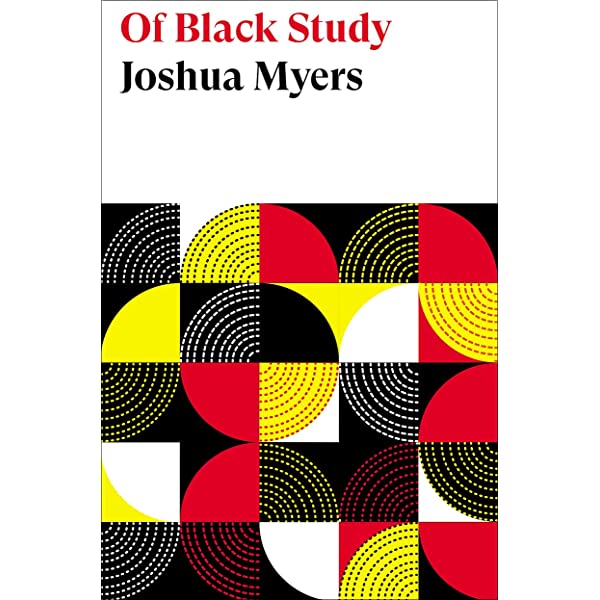
[Pluto Press; 2023]
According to Wikipedia, Black Studies is “an interdisciplinary academic field that primarily focuses on the study of the history, culture, and politics of the people of the African diaspora and Africa.” I realize the cliché of beginning with a dictionary definition. But how else to start reviewing Joshua Myers’s Of Black Study, a book that demands we redefine so much of the familiar, from the nomenclature of academic departments to the foundations of Western knowledge? Even the book’s title kickstarts redefinition. An alternative title, “Of Black Studies,” would hew to Wikipedia, indicating multiple methodologies converging on the shared subject matter of Black content. But Of Black Study centers an identity-driven verb—an act of inquiry affixed to the experience of being Black. One can contribute to Black Studies, perhaps. But to be of Black Study is to inhabit a communal way of living, thinking, and building.
Myers frames Of Black Study as a critique of the neoliberal university. Building on Stefano Harney and Fred Moten’s writings on the “undercommons”—their account of the fugitive energies of the Black radical tradition—Myers calls for a holistic accounting of Black life that explodes academic conventions and bureaucratic boundaries. Currently, Myers says, the power of Black Studies on US campuses is attenuated by the “canard” of interdisciplinarity. Contra Wikipedia’s umbrella definition, Myers insists that situating Black Studies at the intersection of collaborating disciplines is a trap. This enables siloed specialties to parasitize Black Studies in piecemeal fashion, parceling it to so many atomized areas of “Black content studies.” Such an academic scramble for Africa weakens commitments to “intellectual transformation and human liberation,” replacing the multifaceted mission of freedom work with modest bids for historical coverage that get touted by administrators as sufficient evidence of minority representation, antiracism, and diversity and inclusion. Black Studies is most at risk when it is said to fit comfortably—uncomplicated and uncomplicating—astride a business-as-usual curriculum.
But moving beyond institutional critique, the larger target of analysis in Of Black Study is what Myers calls the “lie” of knowledge in the Western world. From Black Studies done right, Myers has learned enduring truths produced by several centuries of Eurocentric racism and colonialism. These are truths about discriminatory laws and bigoted social customs. But these are also deeper truths about the structural tenets of rational thought and liberal self-regard. As Myers writes on page two:
That knowledge we call “normative,” “objective,” and therefore “universal” is not only or simply a fiction or construct; it is a mechanism of power, a force that imposes a particular kind of regime of truth on those who they lie about, who are said to have no knowledge to counter the lie.
Knowledge is a weapon, a pernicious naturalization of one way of being human that relies on the constitutive negation of other (read: Black) ways of being human. This is the case not only when knowledge is wielded with malicious intent but also when knowledge presumes to sit back as the ostensibly neutral arbiter of fact. Black Studies tracks and unpacks the repercussions of this rippling deceit. As Myers explains his aim: “Asking what produces the lie, rather than what constitutes the lie, is a more necessary response than simply refuting the lie.” Instead of merely debunking abusive ideas and policies, Of Black Study digs at the racist roots of an entire worldview.
This project is as ambitious as it sounds. And as Myers is the first to insist, he would have no hope for such an undertaking if not for his intellectual forebears. Because if Of Black Study begins with a focus on contemporary academia, it is sustained throughout by close engagement with a handful of (mostly) past thinkers. Myers draws on June Jordan, W.E.B. Du Bois, Sylvia Wynter, Jacob Caruthers, Cedric Robinson, and Toni Cade Bambara. In chronological terms, Du Bois anchors the assemblage, writing as early as the turn of the twentieth century; Wynter alone remains alive, aged ninety-five. Yet ideas from all these thinkers survive, as Myers demonstrates throughout. These are individuals, Cohen says, “for whom the intellectual domain itself had to be undone in order to know something about the world around us.”
For each thinker, Myers isolates a key concept. In the introduction, June Jordan inspires Myers to center personal experience—to understand how Black Study is a way of life reflectively committed to analyzing the processes of living. Moving forward, chapter one sources from Du Bois an abiding skepticism about scientific study: Whereas science aspires to capture human action in predictable patterns and law, some rogue force—what Du Bois calls “chance”—perpetually eludes this epistemic hubris. Chapter two plumbs Wynter’s revolutionary thesis about the invidious creation of “the human” as a toxic byproduct of the rise of secular authority triggered by the Renaissance. Chapter three considers how Caruthers revived ancient African concepts of divine speech to chart the continent’s history and the promise of diaspora. Chapter four shows how Robinson challenged premises of political order, arguing that rationalist precepts notwithstanding, irrational charisma underpins Western codes of obedience.
In the conclusion, Toni Cade Bambara demonstrates the risks and rewards of Black dreaming. One after another, these chapters dwell with giants committed to the work of redefinition. And if, on the whole, Of Black Study is more preoccupied with sifting through the ruins of modernity’s present than it is with blueprinting new structures to come, the concluding discussion of Bambara’s work reminds us just how challenging it is to build something better. Black dreaming in the model of Bambara poses an existential “threat to the ‘real world’ of pragmatic politics,” and this threat can only appear more unthinkable in an age rocked by planetary and pandemic perils. But if Black Studies seems riskier than ever, we need it as much as ever. It remains, Myers says, an “intellectual conjuration of an otherwise-than-this-mess possibility.’”
Of Black Study is dense and complex. Its chapters are long and detailed; my summaries are brief. Anyone who finds their interest piqued should venture into the full depth and breadth on offer. Myers has read everything, and he’s willing to question it all to fascinating effect. As such, even the most intrepid reader will struggle to come away from this book with total understanding. Myers ranges from hot button political commentary to micro-histories of activist groups to the generational dynamics of Black Marxism to broadsides hurled at Western thought writ large. The result is thrilling, but also disorientating. And this, perhaps, is the point. Expecting “total understanding” from any book, let alone this book, is surely another imperialist fantasy. And the only way to re-orient yourself to fresh possibilities may be to lose your bearings. Certainly, you will leave this book thinking new thoughts, even thinking about the deep historical protocols that determine why you think in the ways that you do.
You will also leave this book with an appreciation for the accomplishments of six famous individuals, and with a higher-order appreciation for Myers’s profoundly human assessment of this ad hoc cohort. Cued by the introduction’s account of June Jordan’s practice of centering the personal, Myers makes a method of treating lived experiences as a primary source. Rather than churn out pages of conventional academic criticism that relies on author biography only sparingly for context, Myers situates each of his predecessors at the intersection of multiple roles and identities. In shifting configurations, each individual emerges as an intellectual, artist, teacher, activist, and organizer; each is also a vulnerable person, energized and rebuffed by turns of happenstance. For instance, Wynter was shaped by “upheavals of her youth” in Jamaica, where mid-century revolutionary movements made her not only a writer but a dancer and an actress. Robinson, meanwhile, developed his theory of racial capitalism only after the “inadequacy of political theory” at Stanford University led him to study abroad at the University of Sussex, where he found a vibrant community of Third World students. Personal circumstance weighs on philosophical project, and vice versa. In lesser hands, this balancing act might falter. But Myers keeps it on kilter.
In large part, Myers succeeds in Of Black Study because he is an exceptionally clear writer. Appropriate to his own human-centric critical method, the book reflects the many facets of Myers’s complex personhood. He is a scholar whose subject-matter expertise shines. He is an academic whose years of coming up through Black universities causes him to deploy the pronoun “we,” a direct address that beckons the community he claims. He is a passionate teacher, whose sentences display care, patience, and compassion for his readers. And he is an accomplished poet, whose ear for language modulates each page and produces two standalone sections of free verse in the book. To be Of Black Study, the poem in the conclusion urges, is:
to be of
each other,
to be of
our worlds
to be of
a practice of study,
Benjamin Murphy, PhD, is a Lecturer in the English Department at Elon University, where he teaches courses on writing, American and African American literature, and genre fiction. Find out more about his teaching, research, and writing by visiting benjamin-murphy.com or by following him @benjmurph.
This post may contain affiliate links.







